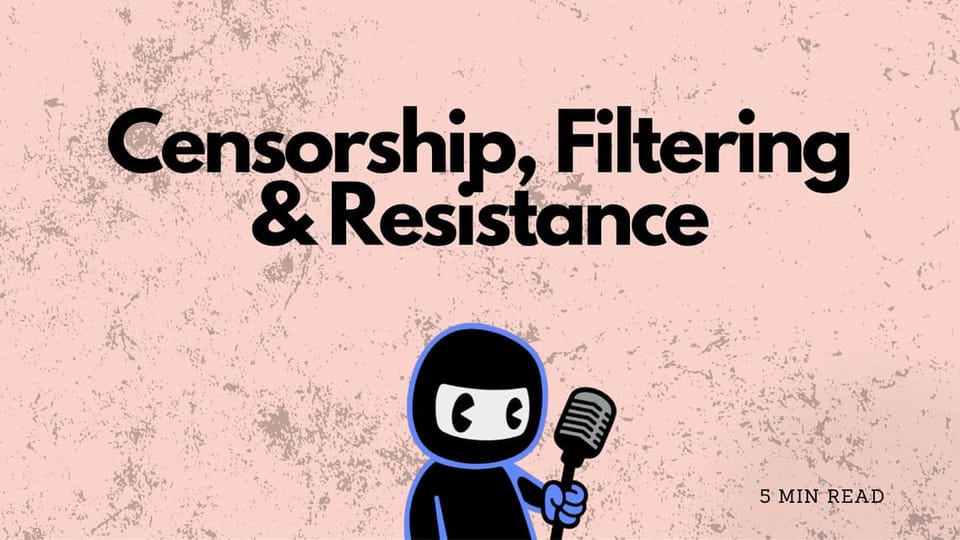Censorship, Filtering & Resistance

Most times in life when an issue happens, you can solve it at the same place the damage occurred.
If someone insults you, they can apologize or you can leave.
If fraud happens on your account, the bank you have your account at can help.
If you break your leg, the doctor will put on a cast where the break occurred.
Censorship and its solution don't work like this.
People talk alot about Bitcoin being censorship-resistant.
What does that actually mean?
In Bitcoin land, this should mean that you can't be stopped from using the network. The code will process everything against a set of defined rules.
But that isn't how it works in practice.
Bitcoin miners create bundles of transactions and package them together into a single block. They (the miners) get to choose what is included in the block.
If they don't want to include a monkey jpeg in their block, it is trivial to do and they are fully within the rules of the network.
So how is Bitcoin censorship-resistant?
As long as other miners on the network accept these types of transactions Bitcoin is censorship-resistant.
You can think of it as a different entrance into the building. If the front door is locked (Miner A), you can go around and get in through the side door (Miner B).
If all miners on the network don't accept your transaction, you are effectively censored from the network.

Let's briefly touch on filtering.
So now we have rough definitions that tell us:
Censorship: The blocking of access to something.
Filtering: The sorting or separating of something but you still have access.
Censorship-Resistant: The inability to prevent access to something.
Centralized vs Decentralized Networks
This is where things get weird because these definitions of censorship, filtering, and resistance work differently under different kinds of networks.
Let's compare sending an email via Gmail with a miner receiving a Bitcoin transaction.
Gmail (Centralized)
Censorship: Google controls the email platform. They can choose to stop an email from being delivered and you would not know.
Filtering: Anything that makes it past their censor above you can filter as you want.
Censorship-Resistant: The end user cannot get their email out from Gmail if Google doesn't allow it. Google must decide to stop censoring.
Bitcoin Miner (Decentralized)
Filtering: The miner can see all the transactions currently in the queue and select the ones they want to include in their block.
Censorship: The miner decides to include only certain types of transactions and appends those to the chain. When they win a block, all transactions that don't fit that criteria are effectively censored.
Censorship-Resistant: The miner doesn't have enough hash rate to find every block. When they don't win, other miners append to the chain and can include different types of transactions.
Hopefully, you can see above how nuanced this topic is.
Gmail is not censorship-resistant, but email is.
Bitcoin is currently censorship-resistant but that could change.
A network or platform can only be considered resistant to censorship if it provides users with alternative methods to obtain the information they seek.
In a centralized world of large media platforms. We don't really have resistance to censorship. We can only ask and be granted that these platforms choose not to block information.
Which makes it increasingly necessary we create decentralized alternatives to provide new avenues for access.
Till the next essay.
- Jake